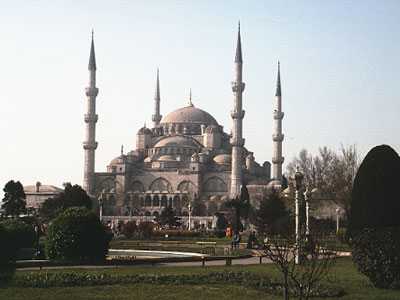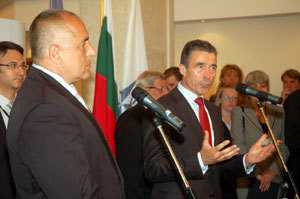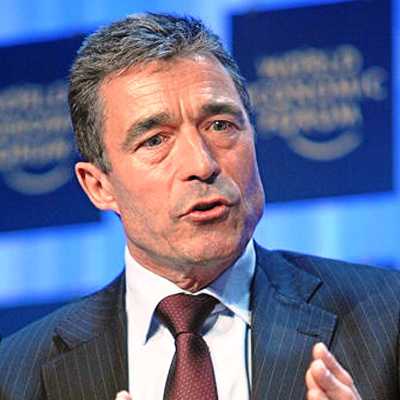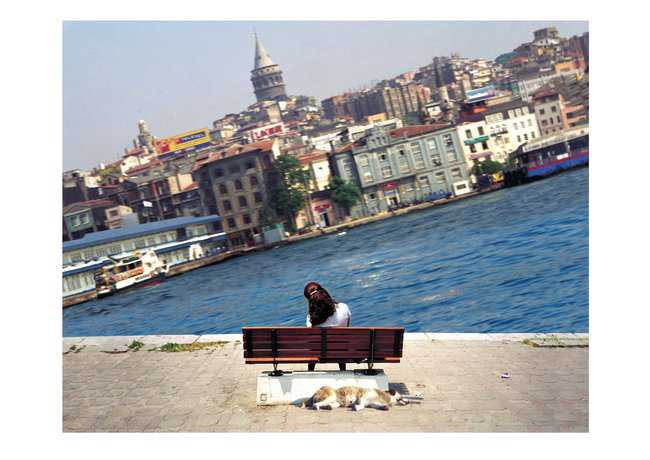This post is authored for PoliGazette by Robert Ellis. As usual, guests posts do not necessarily reflect the opinion of PoliGazette or any of its authors.
Three weeks ago Stephen Kinzer claimed in The Guardian that NATO had “dissed” the Muslim world by nominating Danish PM Rasmussen as its new secretary-general. But the boot is on the other foot.
The occasion was the 60th anniversary of the founding of the NATO alliance in 1949. The preamble to the treaty declares that the parties are “determined to safeguard the freedom, common heritage and civilisation of their peoples, founded on the principles of democracy, individual liberty and the rule of law”. In other words, the alliance was founded to defend the values on which our Western civilisation is based.
However, the question that arose during the debate surrounding Anders Fogh Rasmussen’s candidacy is how far Turkey, which has been a loyal and stable member of the alliance since 1952, shares these values, especially since the advent of the AKP (Justice and Development Party) government in 2002. Since the end of the Cold War NATO now faces a confrontation with militant Islam, particularly in Afghanistan and Iran. And the main objection that Turkey raised, that of the role played by the Danish prime minister during the cartoon crisis in 2005, created a doubt as to whether Turkey was acting as a spokesman for the Muslim world or the Western alliance.
The cartoon crisis
The background to the cartoon crisis was the attack on a lecturer at Copenhagen University in October 2004, because he as a ‘kuffar’ (unbeliever) had recited from the Koran during a lecture. The following month the Dutch filmmaker, Theo van Gogh, was murdered because his critical view of Islam, “Submission”, had been shown on Dutch tv.
Consequently, a Danish author of a children’s book on the life of the prophet Muhammad had difficulty in a finding an illustrator, and when he finally found one, the artist insisted on remaining anonymous. This, coupled with other incidents of self-censorship, prompted the Danish daily Jyllands-Posten to ask the Danish Cartoonists’ Association to draw the prophet “as you see him”. 12 replied, and the cartoons were published at the end of September 2005.
Then the ball started rolling. 11 Muslim ambassadors wrote to the Danish prime minister, complaining of the “ongoing smearing campaign” against Islam and Muslims, and called on Rasmussen to “take all those responsible to task under law of the land”. In fact, the tone of the letter was not, as Stephen Kinzer alleges, conciliatory but confrontational.
Three days later the Danish prime minister received a letter from Ekmeleddin Ihsanoglu, the Turkish secretary general of the OIC (Organisation of the Islamic Conference), reiterating the ambassadors’ complaint. In the circumstances, Rasmussen decided not to meet with the ambassadors and sent an identical reply to them and the OIC, where he explained that the freedom of expression has a wide scope and that the Danish government has no means of influencing the press.
Shortly afterwards Rasmussen reminded Turkey that one of the criteria that qualify for EU membership is that a society complies in full with democratic principles, including the freedom of expression and the press’s unlimited right within the law to criticize both political and religious authorities.
Between two stools
Turkey’s problem, which has been underlined by the recent controversy, is that it falls between two stools. On the one hand, Turkey as a member of the Council of Europe is signatory to the European Human Rights Convention, which maintains the right of freedom of expression subject to such laws as are necessary in a democratic society. On the other hand, as a member of the OIC it is also signatory to the Cairo Declaration of Human Rights in Islam, which stipulates that everyone shall have the right to express his opinion freely “in such manner as would not be contrary to the principles of the Shari’a”.
The Turkish premier, Recep Tayyip Erdogan, explained that his objections to Rasmussen’s appointment were those that had been expressed to him by various Muslim states, in which case the question arises whether Turkey, as a member of NATO and a candidate for EU membership, is a spokesman for the Muslim world or representative of Western values in that region.
This is not the first time Erdogan has been caught in such a conflict. For example, the European Court of Human Rights upheld the headscarf ban at Turkish universities in 2005, but Erdogan immediately disputed the Court’s competence to issue a ruling on this issue. “That right”, he stated, “belongs to the scholars of Islam”. This is the same Erdogan that fifteen years ago declared: “Thank God Almighty, I am a servant of the Shari’a.”
Olli Rehn, the EU’s enlargement commissioer, also found the ground for Turkey’s opposition to Rasmussen’s candidacy “a bit hollow” and added: “It does not look good from a European perspective, because freedom of expression is such a fundamental value, and meanwhile Turkey is aiming to become a member of the European Union.”
Turkey’s president, Abdullah Gül, found Rehn’s remarks “unpleasant” and warned that such criticism could have consequences for Western securíty. According to Gül: ´”We acted in a rational, logical and modern way”, but it was only Barack Obama’s intervention that forestalled a standoff.
It is ironic that the NATO summit in Strasbourg was followed by the second forum in the Alliance of Civilizations in Istanbul. Here Rasmussen once again stressed that freedom of expression is a precondition for open dialogue and that all forms of censorship are enemies of that dialogue. Turkey, which has a dismal human rights record and ranks 102nd out of 173 countries in terms of freedom of the press, should – instead of being offended – take the new secretary-general’s remarks to heart.
Robert Ellis is a regular commentator on Turkish affairs in Denmark and from 2005 to 2008 was a frequent contributor to the Turkish Daily News.






